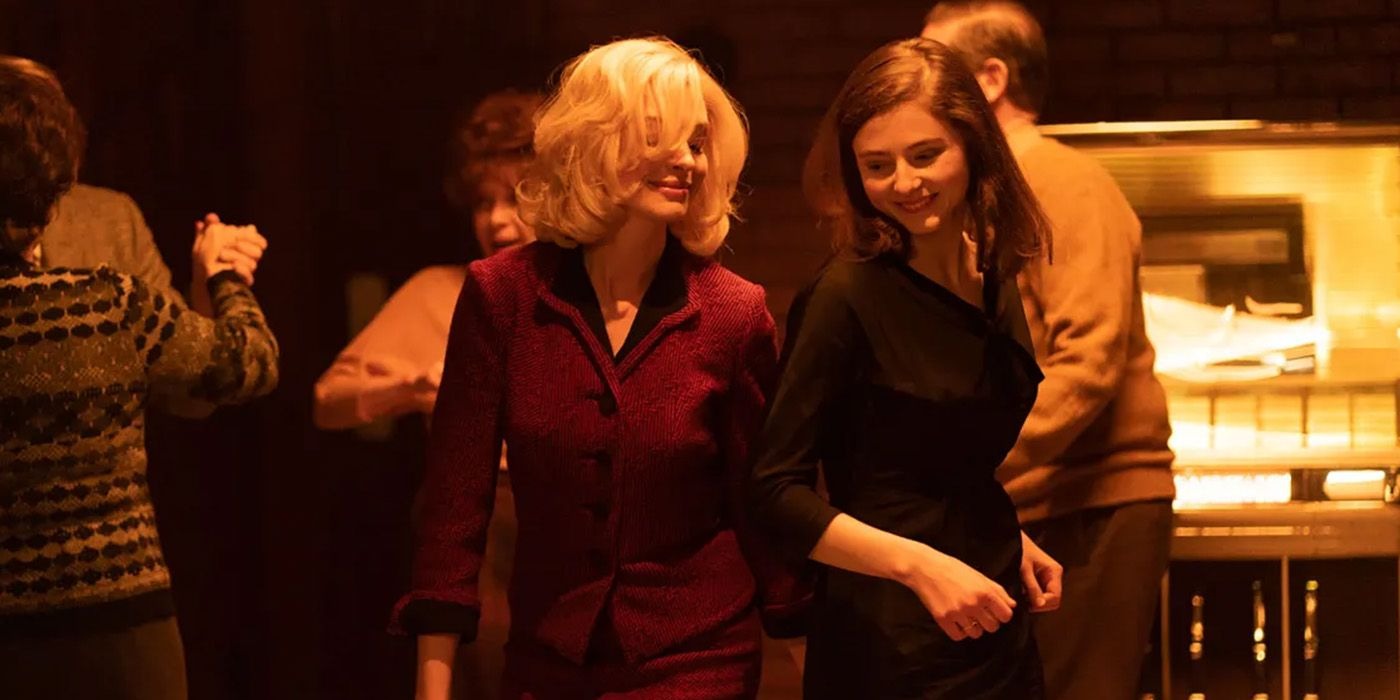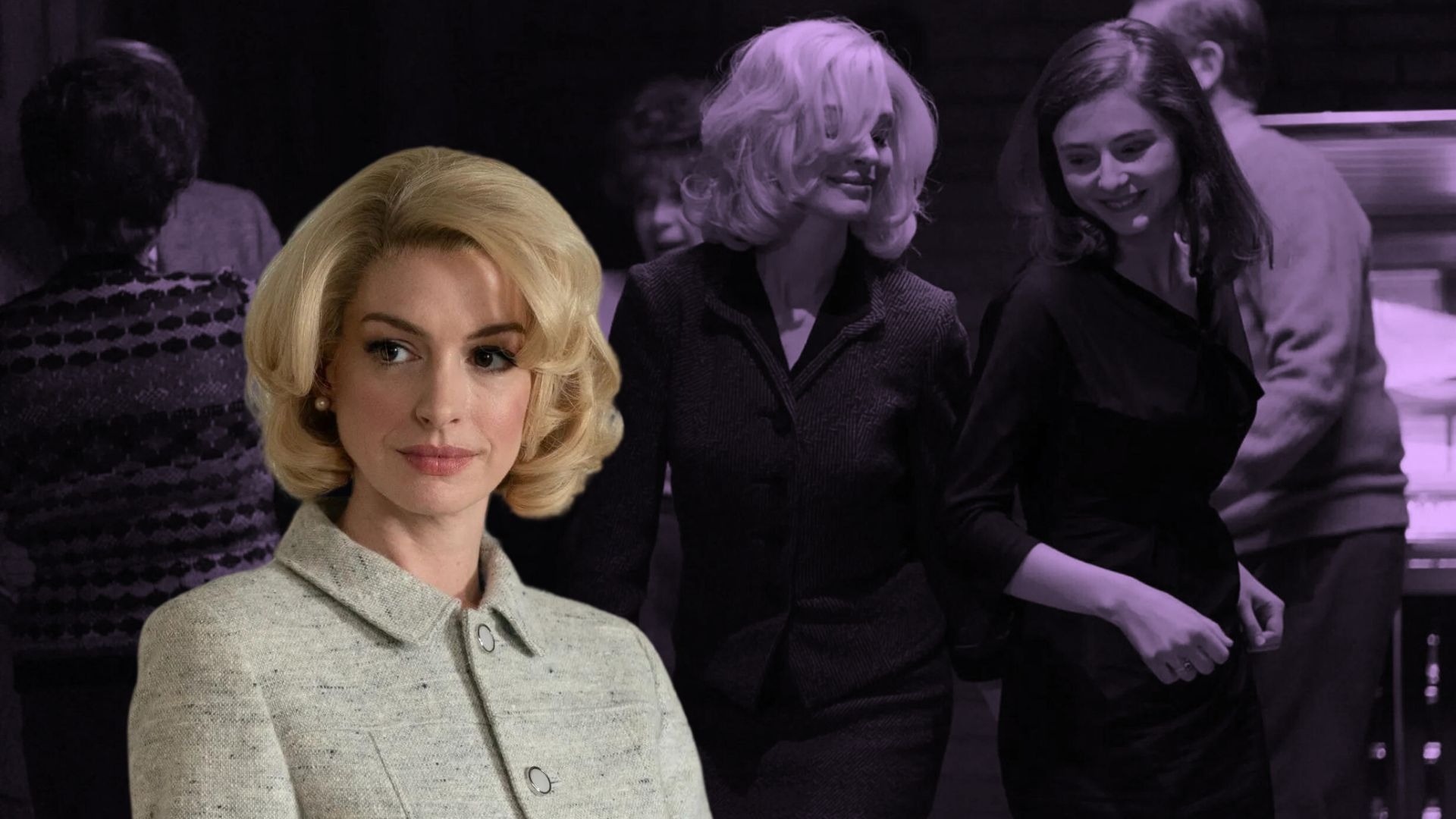Anne Hathaway, widely known for her elegant roles and charming on-screen presence, takes on a completely different persona in Eileen. Swapping her signature glamorous dresses for a sharp power suit, a refined accent, and an assertive disposition, she embraces a psychological thriller that has been largely underrated.
The film, based on Ottessa Moshfegh’s novel of the same name, tells the story of Eileen Dunlop (played by Thomasin McKenzie), a young woman who feels completely isolated and defeated in all aspects of her life.

Her perspective takes a drastic turn when she encounters Rebecca Saint John (Hathaway), her newest colleague, leaving Eileen uncertain whether she desires Rebecca’s companionship or aspires to embody her.
At first glance, Eileen might seem like a typical psychological drama where a woman gradually loses her grip on reality, but a closer look at the characters reveals layers of complexity.
Hathaway has mentioned that Eileen is not a reliable narrator, which raises questions about Rebecca’s seemingly flawless presence in her life (as cited by Entertainment Weekly).
The movie’s unexpected developments and unresolved plot points leave audiences questioning how much of Eileen’s experience is factual versus imagined. By the time the credits roll, viewers are left with lingering doubts, and Hathaway simply states, “The only person we can ask is Eileen.”
Understanding Eileen: A Psychological Thriller Packed with Twists
Since Moshfegh and her husband, Luke Goebel, were actively involved in adapting the screenplay, audiences can expect a strong connection between the film’s plot and the original book. Eileen introduces its lead character as a lonely woman stuck in a monotonous and unfulfilling life.
Living under the same roof as her widowed, alcoholic father, she craves attention from a male colleague and struggles to connect with her coworkers at a correctional facility for teenage boys. When Rebecca Saint John, a new psychologist, joins the institution, Eileen becomes instantly drawn to her.
Rebecca’s confidence, beauty, and direct approach set her apart—and for the first time, Eileen feels truly seen. A bond forms between them almost immediately, but Eileen soon realizes that Rebecca is far from the ideal figure she had imagined.
On Christmas Eve, Eileen receives an unexpected invitation from Rebecca, who asks her to visit her home for drinks. Eager for the chance to be wanted, Eileen arrives with enthusiasm, but the evening takes a strange turn. Rebecca reveals that she has taken drastic measures against the mother of one of her patients, Lee Polk—a young man who had fatally stabbed his father.
Inside the house, Eileen discovers that Rebecca has restrained Lee’s mother in the basement, claiming that she uncovered shocking details about why the boy committed such a violent act. Initially, Eileen hesitates and considers leaving, but Rebecca persuades her otherwise.
This moment of validation fuels Eileen’s desire to prove herself, leading her to assist in extracting a confession from Lee’s mother. However, an unstable mix of heightened emotions, alcohol, and impulsive decisions soon creates a catastrophic situation.
Eileen’s Troubled Past and Its Influence on Her Actions
From the outset, it is evident that Eileen’s mental well-being has been deeply affected by her upbringing. She resides with a father who is not only emotionally and verbally abusive but also constantly intoxicated.
His previous role as a police chief allows him to evade consequences, with the authorities relying on Eileen to clean up after him. Adding to her struggles, Eileen continues to wear her late mother’s clothing, a habit that suggests she is unable to fully move on from the past.
While she may not be attempting to replace her mother, her father’s behavior leaves her with little choice but to assume responsibilities beyond her years. A particularly unsettling moment occurs when, while driving him to the hospital after he injures himself, her father drunkenly strokes her leg and calls her by her mother’s name.
Beyond her dysfunctional home life, Eileen also grapples with a deep sense of invisibility at work. Her isolation makes her desperate for any form of companionship. So, when Rebecca arrives and pays attention to her, Eileen clings to the connection. She longs to feel valued, to be acknowledged by someone who commands respect.
Some viewers have speculated that Rebecca might not even be real, but rather a projection of Eileen’s desires. Rebecca embodies traits that Eileen lacks—she commands authority, challenges injustice, and acts decisively when she feels the system has failed.
While Eileen was immediately drawn to Rebecca, what remains a mystery is what made Rebecca gravitate towards Eileen.
A Closer Look at Eileen’s Ending: Is She Free or Unstable?
The film’s climax brings Eileen and Rebecca to a tense confrontation with Mrs. Polk in the basement. In a shocking turn of events, Eileen shoots the woman while Rebecca forces her to ingest a lethal dose of pills.

With the deed done, they transport the body to Eileen’s car and agree to regroup at Eileen’s house, planning to frame her father for the murder before escaping to New York together. However, Rebecca never follows through with the plan. Instead of meeting Eileen, she disappears without a trace.
Left to deal with the situation alone, Eileen takes her car—with the body still in the trunk—and drives into the woods, where she abandons the vehicle. A passing truck driver then picks her up, and as she rides off into the unknown, she wears a faint, unsettling smile.
Her expression raises disturbing questions about her state of mind. Does she feel satisfaction in what she has done, or has she completely detached from reality? Considering Eileen’s history of unreliable storytelling, the coincidences in her story become difficult to ignore.
She had fantasized about killing her father and even suggested to Rebecca that most people secretly harbor similar thoughts. Additionally, much like Lee Polk’s past experiences, Eileen has been subjected to inappropriate behavior by her father.
During the film, there is an ambiguous moment where his hand lingers on her thigh before the scene abruptly cuts away, leaving room for speculation on whether the situation escalated further. Adding to this is Mrs. Polk’s final words before her death—she tells Eileen that she has never truly experienced heartbreak.
Strikingly, her father had made a similar remark earlier, telling Eileen that she would never understand love. The eerie similarity between these statements raises questions about whether the body in Eileen’s car is truly Mrs. Polk’s or if she has instead taken revenge on her father.
If she did indeed kill him, then her smile at the film’s conclusion could signify a sense of liberation—an end to the burden she has carried for so long. On the other hand, she may have simply lost touch with reality and is embracing the idea of running away from her past.



